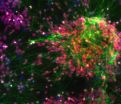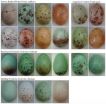(Press-News.org) ROCHESTER, Minn. -- A new research study of the effect of a commonly used strategy to reduce the spread of antibiotic-resistant bacteria in hospital intensive care units (ICU) shows that the strategy had no significant effect. That's the surprising finding of a multisite study led by Mayo Clinic investigators. The bacteria -- methicillin-resistant Staphylococcus aureus (MRSA) and vancomycin-resistant enterococcus (VRE) -- are resistant to common antibiotics and harder to treat if patients become infected. The findings appear in today's New England Journal of Medicine (http://www.nejm.org/).
The strategy includes screening patients admitted to ICUs for MRSA or VRE carriage -- a procedure called "active surveillance" (required by law in some states) -- and use of barrier precautions (gloves and gowns) by health care providers during the care of patients carrying these bacteria.
"We were surprised by the 'no effect' result, especially given two facts. First, many patients who were not previously known to be carriers of MRSA or VRE were identified by active surveillance. Secondly, MRSA or VRE positive patients were cared for using barrier precautions for nearly their entire ICU stay," says W. Charles Huskins, M.D. (http://mayoresearch.mayo.edu/mayo/research/staff/huskins_wc.cfm), Mayo Clinic infectious diseases specialist and lead author of the article.
Purpose of the Study
The study focused on whether this strategy was effective in preventing the spread of MRSA and VRE, not whether it reduced infections caused by these bacteria. In addition to hand hygiene, barrier precautions prevent contamination by MRSA or VRE of health care workers' hands, clothing, and the equipment and environmental surfaces around the patient, which may serve as sources for spread of these bacteria to other patients. Infections are prevented by other sets of interventions.
The assumption -- and the hypothesis of the study -- was that an intervention that included active surveillance and expanded use of barrier precautions would reduce the spread of MRSA and VRE in the participating ICUs, compared to existing practice in the control ICUs.
How the study was conducted
The study was conducted in 18 ICUs at major academic medical centers around the country and used a cluster-randomized design -- a scientifically rigorous design for this type of study -- to test the effect of the intervention. Each ICU, and all the patients cared for in the ICU, represented a "cluster" and was assigned randomly to provide care using the intervention or its existing (control) procedures.
In all ICUs, active surveillance of MRSA and VRE was conducted. Swabs of body surfaces were obtained from patients soon after admission to the ICU and cultured for MRSA and VRE. Culture results were reported only to intervention ICUs.
In intervention ICUs, patients who had cultures that were positive for MRSA or VRE, or who had a history of being positive during the previous year, were cared for using contact precautions, which required health care providers to practice hand hygiene and wear clean gloves and a gown for all contacts with these patients or their surroundings. Newly admitted patients were cared for using universal gloving, which was similar to contact precautions except use of a gown was not required, until the admission culture results were negative for both MRSA and VRE.
In both groups of ICUs, observers located in the patients' rooms recorded data on health care providers' hand hygiene practices and use of gloves and gowns.
The Findings
Active surveillance identified a large subgroup of patients not previously known to be colonized with MRSA or VRE. In intervention ICUs, patients who were colonized or infected with MRSA or VRE were assigned to care either using contact precautions or universal gloving for 92 percent of the days they spent in the ICU.
Despite this, there was no difference in the frequency of new colonization or infection events with MRSA or VRE, or with each separately, when comparing intervention ICUs to control ICUs. Hand hygiene and use of gloves and gowns by health care providers in intervention ICUs was less than required. Additional analyses showed that this was not likely to be the sole explanation for the results of the trial, but the authors say that "exemplary performance" in this regard may reduce the spread more effectively.
The researchers conclude that merely identifying more colonized patients through active surveillance and expanding the use of barrier precautions are not likely to be broadly effective. They suggest that better adherence to isolation precautions is important, but may need to be complemented by interventions that reduce colonization on body sites and improve environmental cleaning.
###
Other authors of the study include Charmaine Huckabee, Heather Kopetskie, Louise Zimmer and Dennis Wallace, Ph.D., of Rho Federal Systems Division, Inc., Chapel Hill, N.C.; Naomi O'Grady, M.D., and Patrick Murray, Ph.D., of the National Institutes of Health; Mary Ellen Walker, University of Alabama at Birmingham; Ronda Sinkowitz-Cochran and John Jernigan, M.D., Centers for Disease Prevention and Control; Matthew Samore, M.D., University of Utah; and Donald Goldmann, M.D., Harvard Medical School and the Institute for Healthcare Improvement. Other trial investigators and participating centers are named on the journal website.
The study was funded primarily by the National Institute of Allergy and Infectious Diseases with support from the National Center for Research Resources to the Mayo Clinic Center for Translational Science Activities and the Emory University General Clinical Research Unit. Merck and Co., Inc., Elan Pharmaceuticals, Inc., Roche Diagnostics, and Kimberly-Clark also provided support for the study.
About Mayo Clinic
Mayo Clinic is a nonprofit worldwide leader in medical care, research and education for people from all walks of life. For more information, visit www.mayoclinic.org/about/ and www.mayoclinic.org/news.
END
A team of scientists at Penn State University, the Salk Institute for Biological Studies, and other institutions have developed a method for recreating a schizophrenic patient's own brain cells, which then can be studied safely and effectively in a Petri dish. The method brings researchers a step closer to understanding the biological underpinnings of schizophrenia. The method also is expected to be used to study other mysterious diseases such as autism and bipolar disorder, and the researchers hope that it will open the door to personalized medicine -- customized treatments ...
LA JOLLA, CA- After a century of studying the causes of schizophrenia-the most persistent disabling condition among adults-the cause of the disorder remains unknown. Now induced pluripotent stem cells (iPSCs) generated from schizophrenic patients have brought researchers from the Salk Institute for Biological Studies a step closer to a fundamental understanding of the biological underpinnings of the disease.
In their study, published in the April 13, 2011 advance online issue of the journal Nature, the Salk team reports both that neurons generated from these patient-derived ...
A new MRI device that guides surgeons as they implant electrodes into the brains of people with Parkinson's disease and other neurological disorders could change the way this surgery, called deep brain stimulation, is performed at medical centers across the country, according to a group of doctors at University of California, San Francisco.
Deep brain stimulation can help to alleviate patients' symptoms, and the new device will make the procedure faster and more comfortable for the patient. It grew out of a home-grown technique developed by a team of UCSF neurosurgeons ...
NGC 3582 is part of a large star-forming region in the Milky Way, called RCW 57. It lies close to the central plane of the Milky Way in the southern constellation of Carina (The Keel of Jason's ship, the Argo). John Herschel first saw this complex region of glowing gas and dark dust clouds in 1834, during his stay in South Africa.
Some of the stars forming in regions like NGC 3582 are much heavier than the Sun. These monster stars emit energy at prodigious rates and have very short lives that end in explosions as supernovae. The material ejected from these dramatic events ...
Paleontologists from the American Museum of Natural History and the Chinese Academy of Sciences announce the discovery of Liaoconodon hui, a complete fossil mammal from the Mesozoic found in China that includes the long-sought transitional middle ear. The specimen shows the bones associated with hearing in mammals— the malleus, incus, and ectotympanic— decoupled from the lower jaw, as had been predicted, but were held in place by an ossified cartilage that rested in a groove on the lower jaw. The new research, published in Nature this week, also suggests that the middle ...
Free bingo site City Bingo has stepped up its devotion to providing its players with an array of weekend special and promotions. The metropolitan bingo site already offers 70% bonuses on Saturdays and 80% bonuses on Sundays and has now added The Bingo Avenue Tournament.
Players depositing at weekends had already been enjoying the aforementioned bonuses on their deposits and the introduction of their latest game is likely to keep the site buzzing. The new feature involves players picking numbers that they don't think will come up in a draw, they can swap any points accrued ...
Infectious disease is a huge cause of death globally, and is a particular threat to newborns whose immune systems respond poorly to most vaccines. A new approach developed at Children's Hospital Boston, using an adjuvant (an agent to stimulate the immune system) along with the vaccine, shows promise in a study of blood from Gambian infants. Results will appear in the open-access journal PLoS ONE on April 13.
The ability to immunize newborns would close their window of vulnerability to serious infections during the first months of life, such as respiratory syncytial ...
If you have been diagnosed with breast cancer that requires surgery, the time to consider reconstruction options is now, even before you schedule your mastectomy or lumpectomy. Because the type of mastectomy procedure you receive can have a significant impact on your reconstruction options, failing to consider your options early can limit them later.
Getting breast reconstruction is optional, it is not required, and some women find that life without breasts is freeing. However, if you would prefer to maintain your feminine appearance, breast reconstruction is a far ...
VIDEO:
The film clip shows a nest of the most frequent host of the cuckoo finch, the tawny-flanked prinia, which has an extravagantly diverse range of eggs. The prinia parent has...
Click here for more information.
New research reveals how biological arms races between cuckoos and host birds can escalate into a competition between the host evolving new, unique egg patterns (or 'signatures') and the parasite new forgeries.
Brood parasitic birds such as cuckoos lay eggs ...
The moments immediately following a serious auto accident can be overwhelming and scary, especially if someone suffers serious personal injury or death. Oftentimes, people are in a state of shock and not thinking clearly following a horrific car accident, but the moments immediately following the accident are critical to the outcome of a personal injury claim that may be filed later.
For this reason, even though you will be overwhelmed and frightened, it is important that you take certain steps after a car accident and never admit fault at the scene of the accident ...




